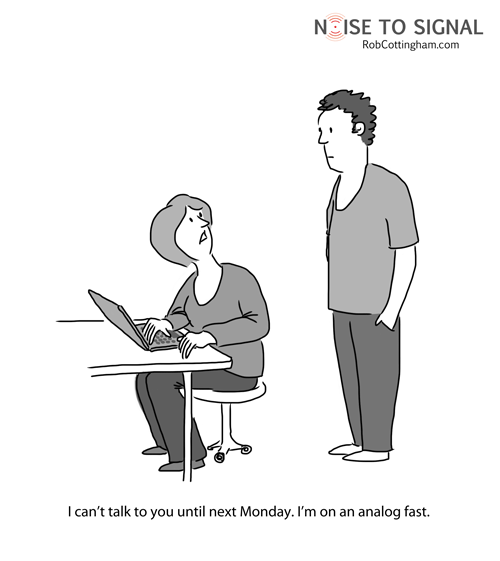Suddenly, it seems like people everywhere are on digital fasts. They’re unplugging from the Internet, turning off their mobile devices and contemplating the role of online devices, services and relationships in their lives.
I get it. Sometimes you need to step back, look at where something fits into your life, and make some changes. And a break from digital notifications sounds pretty appealing.
But a lot of the folks who tune out, turn off and drop the connection talk about it the same way you might talk about kicking smoking or booze. “I’m going to focus on my real relationships, not my Facebook friends,” they’ll say… on Facebook. (That’s one reason I love Alexandra Samuel’s first point in this blog post.) Or “I’m going to concentrate on what really matters.” Which, it’s hard not to infer, is entirely and exclusively offline.
And that, I don’t buy.
By all means, take a break from your gadgets and screens. Notice what you’ve missed while you were playing Warcraft or live-tweeting Dexter… but also the meaningful things you discover are missing during your fast.
Put the online world’s role in your life into perspective — not just where it distracts you from what matters, but where it connects you to it. Again, I’ll point to Alex:
When we’re online — not just online, but participating in social media — we’re meeting some of our most basic human needs. No, not the need to read the latest Lindsay Lohan update. Needs like creative expression. The need to connect with other people. The need to be part of a community. Most of all, the need to be seen: not in a surface, aren’t-you-cute way, but in a deep, so-that’s-what’s-going-on-inside-your-head way.
Digital connections are the vector for only some of the many insidious distractions rearranging our priorities and distorting our perceptions of the world. So once your e-break is over, try a few other fasts: Don’t answer your phone for a week, and ask people to email or message you instead. The next week, switch to blocking out the news media. The week after that, no shopping.
And as you do the work of putting your digital connections to work for you, instead of the other way around, don’t forget the digital tools that can help. Learn the settings that will tame the notifications on your smartphone, Facebook and elsewhere — and while you’re at it, switch off the email notifications that flood your inbox. Look into settings and apps that can let you focus on the task at hand, whether it’s full-screen mode for your word processor or a utility like RescueTime that helps you figure out where you’re spending your online hours. And schedule some time to review all of this regularly.
That sounds like a lot of work, and it is. Deciding where and how to direct your attention takes real effort whether it’s online or offline.
So while I wish you all luck with your digital fasts, the people who really impress me are the ones who can do that work in both worlds, regularly and well. Disconnecting for a little while is just a first step, and only one of several options at that. It’s what you change when you plug back in that will make the biggest difference.
Update: A lot of tweeting today of this article by Baratunde Thurston on his 25-day Internet absence. It’s well worth a read, especially because of the insights he draws from the experience, and how they shaped his re-entry into the online realm.


3 Comments
One of the best scenes in a documentary about The Pirate Bay:
prosecutor asks one of the founders in court: when did you first meet [other founder] IRL? “in real life”
guy answers: yeah, we actually call that AFK, away from keyboard. The internet is real life to us.
(the doc is online: TPB AFK)
Sounds like he and Alex would get along just fine. :)
[…] next encounter was with Rob Cottingham’s comic, which I’ve loved since I first found out about it through Northern Voice 6 years ago (where […]